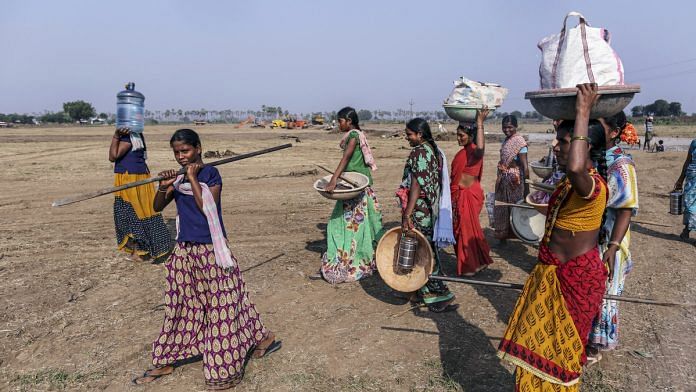Voters who cannot be given jobs can be partly assuaged with better wages.
The frenetic focus on reservation and jobs ahead of the 2019 Lok Sabha polls has rendered the issue of wages invisible. And yet the Budget session is likely to see the introduction and passing of landmark legislation that could impact well over 300 million people: the Code on Wages Bill for statutory minimum wages for unorganised labour.
Voters who cannot be given jobs can be partly assuaged with better wages. Bharatiya Janata Party (BJP)-ruled states are rushing to implement the 10 per cent economic reservation law before the elections, but will they also rush to implement a minimum wage for all if the Code becomes law in the coming Budget session?
The draft Code on Wages Bill 2017 was introduced in the Lok Sabha in August 2017, and referred to the Standing Committee on Labour. It submitted its report at the end of December 2018 with recommendations that give the law more bite. If the Cabinet agrees to incorporate some of these in the final version, the bill can be passed in the session starting 31 January.
Also Read: Modi government’s next budget shouldn’t be excessively bold
The revised bill, if implemented, has vote-getting potential in terms of numbers if the government chooses to capitalise on it. It has major implications for a country in which unorganised labour make up 90 per cent of the labour force according to the report.
And yet neither politicians nor the media are talking about it.
The draft law gives central and state governments the right to fix a minimum wage for all categories of employment, including contract work, part-time work and piece rate work. At present, the provisions of the Minimum Wages Act apply only to employees engaged in scheduled employment. Although a law by itself does not ensure compliance, this one if even partially enforced will impact millions of families below the poverty line.
In a country where the minimum wage is now lower than Rs 6,000 a month in some states, it aims to set a national minimum for a working day of eight hours. Even as the power to fix and revise minimum wages will remain with the appropriate government, the Centre, by notification, may decide a ‘National Minimum Wage’, which may be different for different states or geographical areas.
The states cannot then set a rate lower than this. However, neither the draft law nor the revised version submitted by the Standing Committee mentions a ballpark figure.
Also Read: The hits and misses of Arun Jaitley’s Budgets
The State of Working India Report 2018 by Azim Premji University’s Centre for Sustainable Employment says 82 per cent of male and 92 per cent of female workers in the country earn less than Rs 10,000 a month.
As part of the labour reform initiatives taken by this government, 38 Labour Acts are being amalgamated, simplified and rationalised into four codes—the Code on Wages is the first.
The proposed legislation amalgamates four central labour enactments relating to The Payment of Wages Act, 1936; The Minimum Wages Act, 1948; The Payment of Bonus Act, 1965; and The Equal Remuneration Act, 1976 and was introduced in Lok Sabha on in August 2017 and shortly after referred to the Standing Committee on Labour for examination.
There is a lengthy definition of minimum wages in two parts, one for the purpose of calculation of bonus, as taken from the Payment of Bonus Act and second, for the purpose of payment of wages.
It also stipulates that the wages be revised at least once in five years.
The Bill proposes the creation of facilitators to implement this law, the Standing Committee said: “the use of the term ‘Facilitator’ instead of ‘Inspector’ in the Code gives the impression of diluting the enforcement mechanism and restricting the inspection which is the lifeline of enforcement.”
But the Committee’s sharpest recommendation deals with the penalties proposed for offences by the employer. The draft Code proposed that these vary from Rs 10,000 to Rs 1 lakh only. The Committee felt that the penalty amount proposed was not substantial enough to act as a deterrent. They have recommended it be raised from a minimum of Rs 50,000 to Rs 10 lakh. When they conferred with unions and industry, CII and ASSOCHAM had suggested that the penal amount of Rs 50,000 was on the higher side!
While the Code itself has been opposed by trade unions on various grounds, unorganised labour can only gain from its implementation.
Also Read: India’s next budget may rely on some bogus numbers
By abolishing the concept of scheduled employment for entitlement of minimum wages, a large portion of the workforce, which was out of the purview of the existing Minimum Wages Act, will now be covered by it.
The Standing Committee’s report cites the employment survey carried out by the National Sample Survey Organisation in the year 2011-12 for employment figures. It put the total employment in both organised and unorganised sectors in the country at 470 million, about 80 million in the organised sector and the remaining 390 million in the unorganised sector.
It is evident that unorganised workers constitute a big chunk of the population that is below the poverty line. They are entitled to more rights, not just election-time sops.
Sevanti Ninan is a journalist and researcher and was founder editor of thehoot.org



